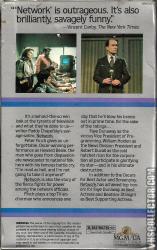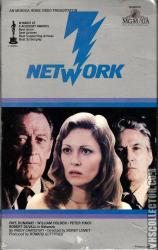Network
Catalog Number
MV60012
-
Primary Distributor (If not listed, select "OTHER")
Catalog Number
MV60012
Primary Distributor (If not listed, select "OTHER")
Release Year
Country
N/A (NTSC)
N/A | N/A | N/A
N/A | N/A
Network (1976)
Additional Information
Additional Information
Not since the dawn of time has America experienced a man like Howard Beale!
"NETWORK"... the humanoids, the love story, the trials and tribulations, the savior of television, the attempted suicides, the assassination -- it's ALL coming along with a galaxy of stars you know and love!
Television will never be the same!
Prepare yourself for a perfectly outrageous motion picture!
A trenchant satire of "trash TV," Network seems to grow only more relevant with each passing year. Howard Beale (Peter Finch), the dean of newscasters at the United Broadcasting System, is put out to pasture because he "skews old." Network executive Max Schumacher (William Holden), Howard's best friend, is forced to deliver the bad news. Beale can't stomach the idea of losing his 25-year post as anchorman simply because of age, so in his next broadcast he announces to the viewers that he's going to commit suicide on his final program. Network head Frank Hackett (Robert Duvall) is all for kicking Beale out then and there, but when it looks as though the UBS is going to have its greatest ratings ever on the night of Beale's self-destruction, ambitious programming exec Diana Christensen (Faye Dunaway) talks Hackett into treating that fateful final telecast as a special event. Naturally, Beale doesn't go through with it -- but he does begin rambling about the horrible state of the world in general and television in particular. He concludes his tirade by admonishing his viewers to "Go to the window and shout as loud as you can: 'I'm mad as hell and I'm not going to take it anymore!'" With that, Howard Beale becomes the hottest TV personality in America, and Diana becomes the network's fair-haired girl. She draws up plans to treat the nightly news broadcast as garish entertainment (complete with a psychic), all built around the rants of Beale, billed as "The Mad Prophet of the Airwaves." Network won Oscars for Paddy Chayefsky's screenplay as well as for three of four acting categories -- Dunaway for Best Actress, Peter Finch for Best Actor (in the only posthumous Oscar yet awarded), and Beatrice Straight for Best Supporting Actress, in one of the shortest-screen-time performances ever to win an Oscar.
Network is a 1976 American satirical film written by Paddy Chayefsky and directed by Sidney Lumet, about a fictional television network, UBS, and its struggle with poor ratings. The film stars Faye Dunaway, William Holden, Peter Finch, and Robert Duvall and features Wesley Addy, Ned Beatty, and Beatrice Straight.
The film won four Academy Awards, in the categories of Best Actor (Finch), Best Actress (Dunaway), Best Supporting Actress (Straight), and Best Original Screenplay (Chayefsky).
In 2000, the film was selected for preservation in the United States National Film Registry by the Library of Congress as being "culturally, historically, or aesthetically significant". In 2002, it was inducted into the Producers Guild of America Hall of Fame as a film that has "set an enduring standard for U.S. American entertainment".[2] In 2006, Chayefsky's script was voted one of the top-ten screenplays by the Writers Guild of America, East. In 2007, the film was 64th among the 100 greatest American films as chosen by the American Film Institute, a ranking slightly higher than the one AFI had given it ten years earlier.
The film became one of the big hits of 1976-1977 and got big receipts and reviews. Vincent Canby, in his November 1976 review of the film for The New York Times, called the film "outrageous...brilliantly, cruelly funny, a topical American comedy that confirms Paddy Chayefsky's position as a major new American satirist" and a film whose "wickedly distorted views of the way television looks, sounds, and, indeed, is, are the satirist's cardiogram of the hidden heart, not just of television but also of the society that supports it and is, in turn, supported."[9]
In a review of the film written after it received its Academy Awards, Roger Ebert called it a "supremely well-acted, intelligent film that tries for too much, that attacks not only television but also most of the other ills of the 1970s," though "what it does accomplish is done so well, is seen so sharply, is presented so unforgivingly, that Network will outlive a lot of tidier movies."[10] Seen a quarter-century later, Ebert added the film to his "Great Movies" list and said the film was "like prophecy. When Chayefsky created Howard Beale, could he have imagined Jerry Springer, Howard Stern, and the World Wrestling Federation?"; he credits Lumet and Chayefsky for knowing "just when to pull out all the stops."[11] The film also ranks at number 100 in Empire magazine's list of the 500 Greatest Films of All Time.[12]
Not all reviews were positive: Pauline Kael in The New Yorker, in a review subtitled "Hot Air", criticized the film's abundance of long, preachy speeches; Chayefsky's self-righteous contempt for not only television itself but also television viewers; and the fact that almost everyone in the movie, particularly Robert Duvall, has a screaming rant: "The cast of this messianic farce takes turns yelling at us soulless masses."[13] Michael Billington wrote, "Too much of this film has the hectoring stridency of tabloid headlines",[14] while Chris Petit in Time Out described it as "slick, 'adult', self-congratulatory, and almost entirely hollow", adding that "most of the interest comes in watching such a lavishly mounted vehicle leaving the rails so spectacularly.
Release Date: November 27, 1976
Distrib: United Artists
Boxoffice: $23,689,877 2013: $89,532,200
"NETWORK"... the humanoids, the love story, the trials and tribulations, the savior of television, the attempted suicides, the assassination -- it's ALL coming along with a galaxy of stars you know and love!
Television will never be the same!
Prepare yourself for a perfectly outrageous motion picture!
A trenchant satire of "trash TV," Network seems to grow only more relevant with each passing year. Howard Beale (Peter Finch), the dean of newscasters at the United Broadcasting System, is put out to pasture because he "skews old." Network executive Max Schumacher (William Holden), Howard's best friend, is forced to deliver the bad news. Beale can't stomach the idea of losing his 25-year post as anchorman simply because of age, so in his next broadcast he announces to the viewers that he's going to commit suicide on his final program. Network head Frank Hackett (Robert Duvall) is all for kicking Beale out then and there, but when it looks as though the UBS is going to have its greatest ratings ever on the night of Beale's self-destruction, ambitious programming exec Diana Christensen (Faye Dunaway) talks Hackett into treating that fateful final telecast as a special event. Naturally, Beale doesn't go through with it -- but he does begin rambling about the horrible state of the world in general and television in particular. He concludes his tirade by admonishing his viewers to "Go to the window and shout as loud as you can: 'I'm mad as hell and I'm not going to take it anymore!'" With that, Howard Beale becomes the hottest TV personality in America, and Diana becomes the network's fair-haired girl. She draws up plans to treat the nightly news broadcast as garish entertainment (complete with a psychic), all built around the rants of Beale, billed as "The Mad Prophet of the Airwaves." Network won Oscars for Paddy Chayefsky's screenplay as well as for three of four acting categories -- Dunaway for Best Actress, Peter Finch for Best Actor (in the only posthumous Oscar yet awarded), and Beatrice Straight for Best Supporting Actress, in one of the shortest-screen-time performances ever to win an Oscar.
Network is a 1976 American satirical film written by Paddy Chayefsky and directed by Sidney Lumet, about a fictional television network, UBS, and its struggle with poor ratings. The film stars Faye Dunaway, William Holden, Peter Finch, and Robert Duvall and features Wesley Addy, Ned Beatty, and Beatrice Straight.
The film won four Academy Awards, in the categories of Best Actor (Finch), Best Actress (Dunaway), Best Supporting Actress (Straight), and Best Original Screenplay (Chayefsky).
In 2000, the film was selected for preservation in the United States National Film Registry by the Library of Congress as being "culturally, historically, or aesthetically significant". In 2002, it was inducted into the Producers Guild of America Hall of Fame as a film that has "set an enduring standard for U.S. American entertainment".[2] In 2006, Chayefsky's script was voted one of the top-ten screenplays by the Writers Guild of America, East. In 2007, the film was 64th among the 100 greatest American films as chosen by the American Film Institute, a ranking slightly higher than the one AFI had given it ten years earlier.
The film became one of the big hits of 1976-1977 and got big receipts and reviews. Vincent Canby, in his November 1976 review of the film for The New York Times, called the film "outrageous...brilliantly, cruelly funny, a topical American comedy that confirms Paddy Chayefsky's position as a major new American satirist" and a film whose "wickedly distorted views of the way television looks, sounds, and, indeed, is, are the satirist's cardiogram of the hidden heart, not just of television but also of the society that supports it and is, in turn, supported."[9]
In a review of the film written after it received its Academy Awards, Roger Ebert called it a "supremely well-acted, intelligent film that tries for too much, that attacks not only television but also most of the other ills of the 1970s," though "what it does accomplish is done so well, is seen so sharply, is presented so unforgivingly, that Network will outlive a lot of tidier movies."[10] Seen a quarter-century later, Ebert added the film to his "Great Movies" list and said the film was "like prophecy. When Chayefsky created Howard Beale, could he have imagined Jerry Springer, Howard Stern, and the World Wrestling Federation?"; he credits Lumet and Chayefsky for knowing "just when to pull out all the stops."[11] The film also ranks at number 100 in Empire magazine's list of the 500 Greatest Films of All Time.[12]
Not all reviews were positive: Pauline Kael in The New Yorker, in a review subtitled "Hot Air", criticized the film's abundance of long, preachy speeches; Chayefsky's self-righteous contempt for not only television itself but also television viewers; and the fact that almost everyone in the movie, particularly Robert Duvall, has a screaming rant: "The cast of this messianic farce takes turns yelling at us soulless masses."[13] Michael Billington wrote, "Too much of this film has the hectoring stridency of tabloid headlines",[14] while Chris Petit in Time Out described it as "slick, 'adult', self-congratulatory, and almost entirely hollow", adding that "most of the interest comes in watching such a lavishly mounted vehicle leaving the rails so spectacularly.
Release Date: November 27, 1976
Distrib: United Artists
Boxoffice: $23,689,877 2013: $89,532,200
Related Links






Comments0
Login / Register to post comments